Tortuga Daypack Pro Review
The Tortuga Daypack Pro is surprisingly packable for such a large and roomy everyday backpack, though its soft structure also causes it to cave in at the top.
Our Verdict
Save time. Get access to brief summaries of our reviews so you can browse and make decisions more efficiently.
Pros
- The Tortuga Daypack Pro is surprisingly packable for such a large and roomy everyday backpack, though its soft structure also causes it to cave in at the top.
- The roomy main compartment can hold a lot of daily gear
- We like the padding and sizable false bottom of the laptop compartment
Cons
- Flexible material doesn’t hold its shape when the bag isn’t completely full
- Zippers are often hard to undo with one hand
- Smaller water bottles aren’t secure in the mesh pockets unless the bag is stuffed
Technical Details
-
Capacity
21l
-
Weight (lb)
1 lb (0.5 kg)
-
Dimensions
17.3 in x 11.6 in x 6.5 in (43.9 x 29.5 x 16.5 cm)
-
Notable Materials
Sailcloth, Ripstop, YKK Zippers, Woojin Hardware
-
Manufacturing Country
Vietnam
-
Warranty Information
Full Review
Get up to 10% off Tortuga • Join Pack Hacker Pro
The Tortuga Daypack Pro has an interesting conundrum regarding its SHELL70RS fabric. On the one hand, it’s a light and thin fabric that saves on weight, making this relatively sizable 21-liter backpack quite packable if you want to stuff it inside your bigger luggage. On the other hand, it gives the Daypack Pro an overall soft structure that can make opening its zippers tricky.
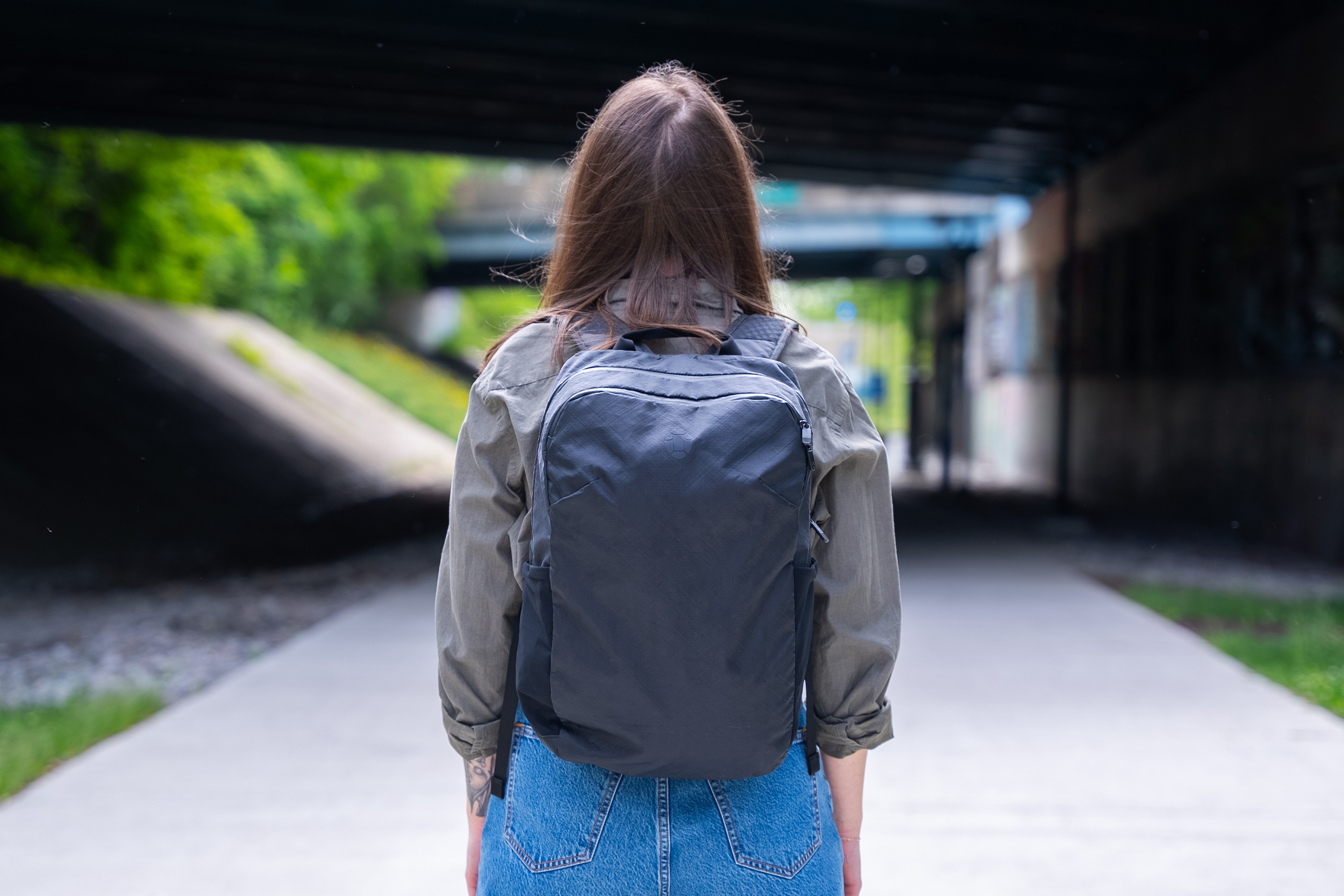
The solution? Pack it full to prevent any areas from caving in. In other words, this daypack is ideal for those who need to carry a lot of gear on a daily basis—read on if that sounds like you.
External Components
The main material on the Tortuga Daypack Pro is SHELL70RS fabric, which aligns with the brand’s ethos of going lightweight with their gear. Both Tortuga Travel Backpacks were designed with weight reduction in mind, so we’re not surprised they’re sticking with it for their daypack options. Touch the fabric and push it around, and you’ll get a sense of how soft and unstructured it is despite the pack’s black and monolithic look. It is a bit wrinkly, but not enough to make it seem unkempt; it’s still a sleek-looking daypack.
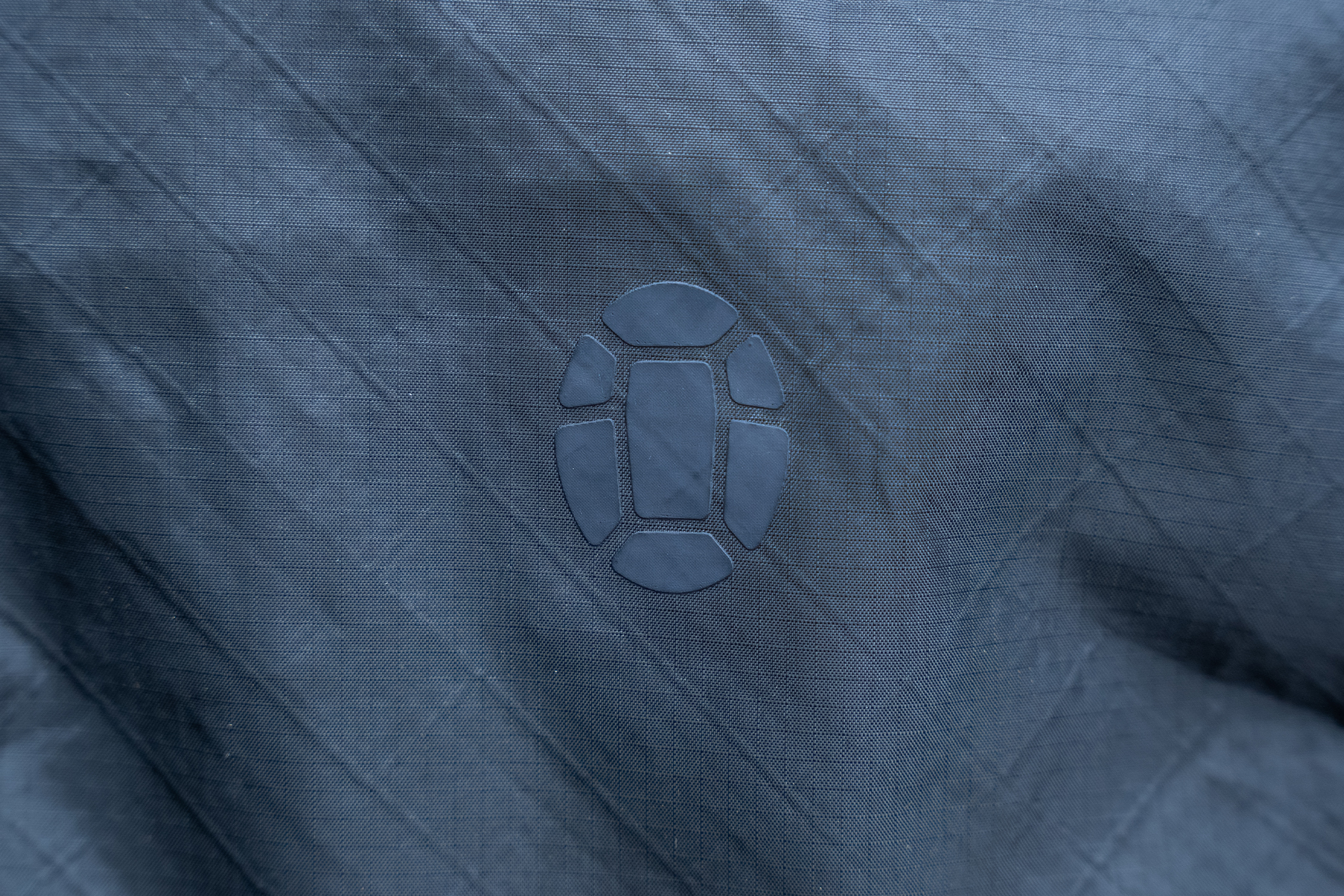
The outer fabric has a familiar X-Pac-like design, minus the cross-ply pattern that gives that fabric its unique look. However, upon closer inspection, you’ll notice a grid-like pattern. That’s because the outer layer of the SHELL70RS is a 70-denier recycled polyester ripstop. For those unfamiliar with ripstop fabric, it’s usually very thin, with a grid texture that serves as its reinforcement. So, instead of a uniformly thick fabric, only that grid is thick for an overall lighter weight.
However, the Daypack Pro’s SHELL70RS isn’t durable enough to be our first pick for an outdoor adventure. It’s not competing at the same level as ballistic nylon fabrics with heavy deniers. However, the fabric is holding up well in day-to-day usage, with no scuffs or markups to show for it after two weeks of testing. It’s also worth noting that the zippers are from YKK, and the hardware (adjusters, buckles, etc.) is from Woojin. Both are reputable brands, and using the Daypack Pro proves as much. Adjusting the buckles and zipping is relatively smooth, with no leftover plastic bits sticking out like you’d find on cheaper alternatives.
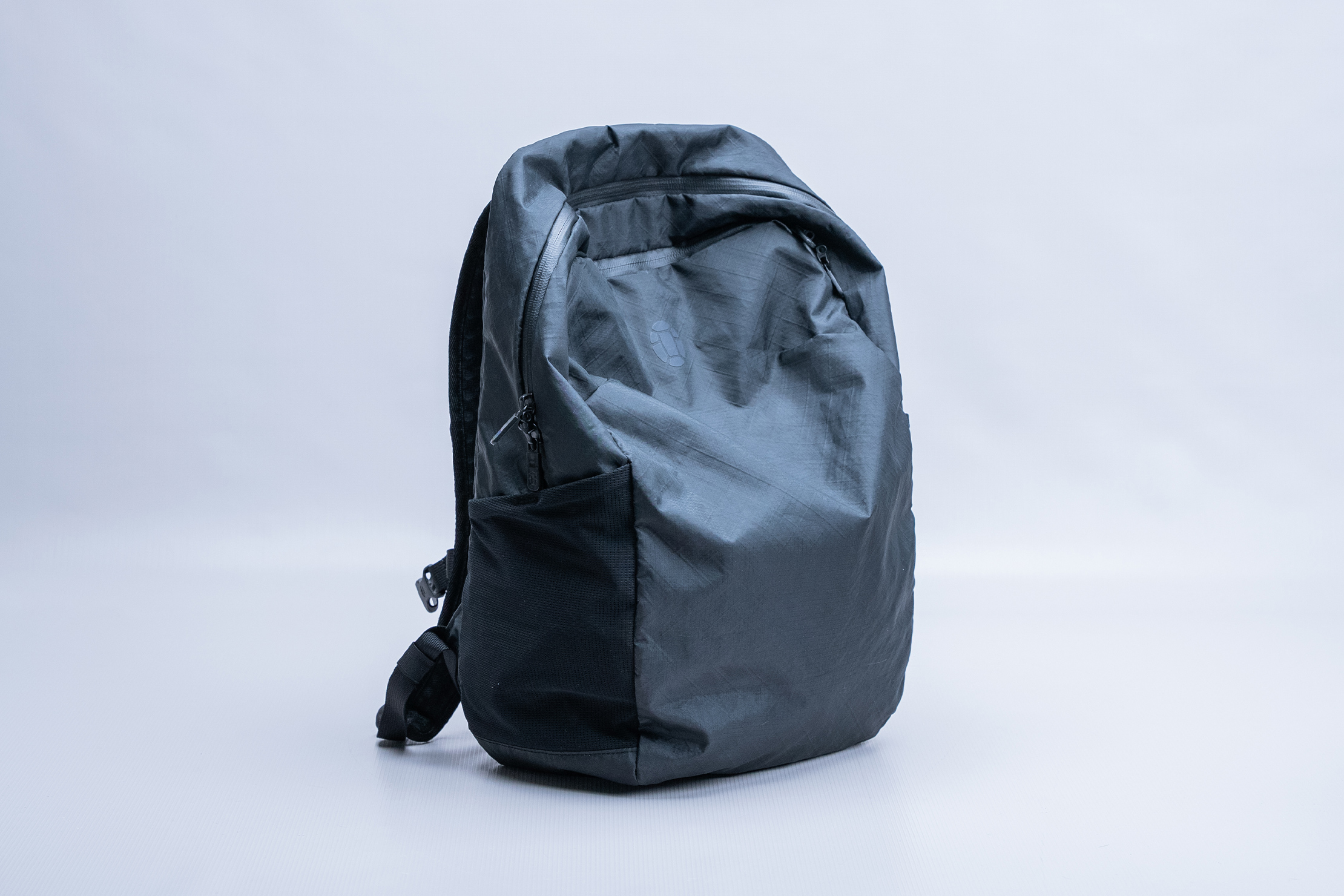
Interestingly, the SHELL70RS is the same material Tortuga uses for their Compression Cube. What does this mean for the Daypack Pro? Though it’s not strictly a packable backpack like the Matador ReFraction Packable Backpack or even Tortuga’s own Packable Backpack, the Daypack Pro is very easy to flatten and roll. In fact, if you’re traveling with a sizable carry on luggage, you can compress this enough to fit inside comfortably.
Since the Daypack Pro is more for everyday use, the harness system isn’t as comprehensive as those found in the Tortuga Travel Backpacks, but it has the basics we’re looking for. There’s a pair of shoulder straps, a sternum strap, a well-padded back panel, and a top grab handle. If anything is missing, it’s a luggage pass-through; you’ll have to make do with the shoulder straps if you’re looking for that functionality.
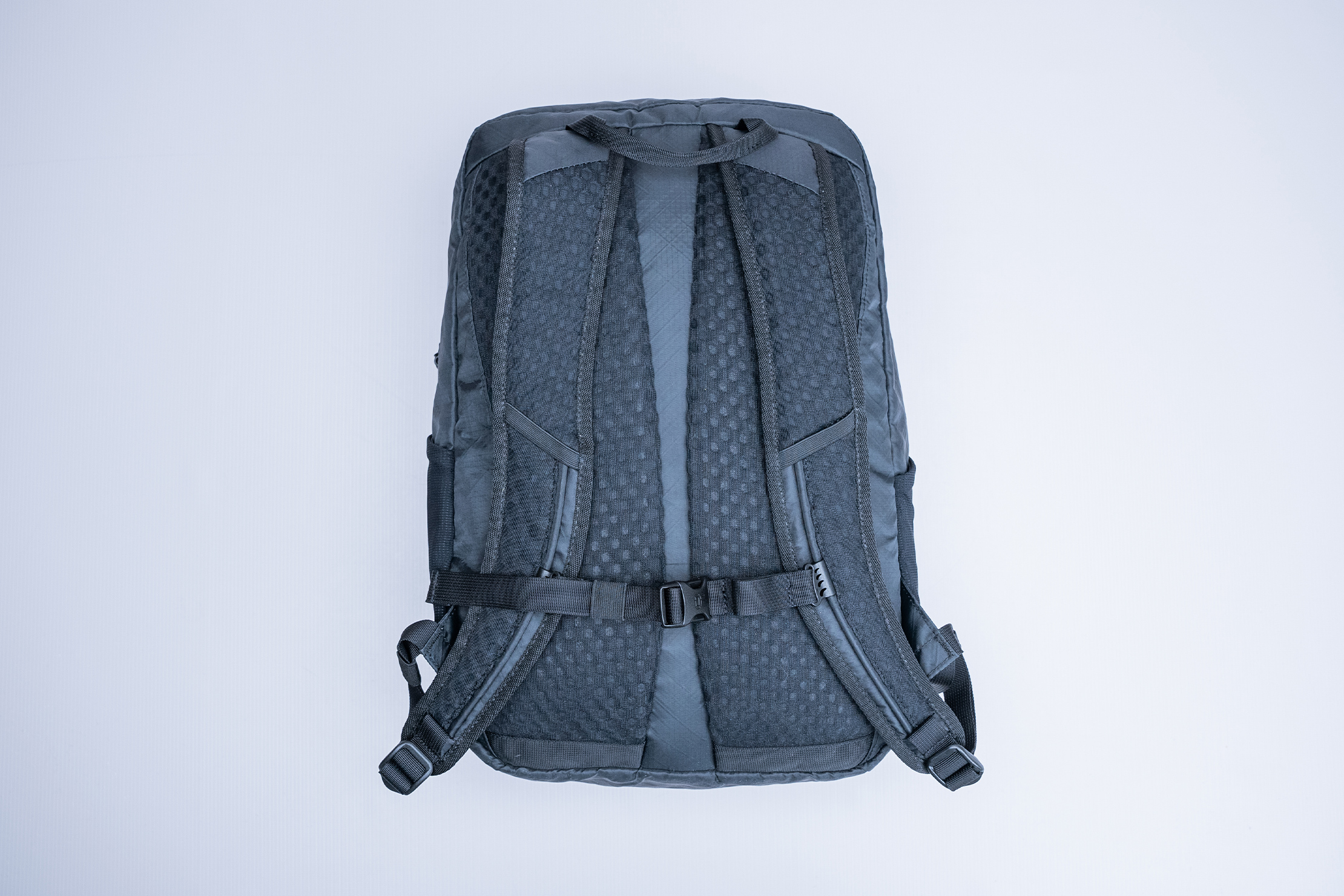
The padding on this harness system is noteworthy. Underneath the mesh, it is also aerated with holes to further aid in breathability. That said, we suspect Tortuga also went with this design as a weight-saving measure. Regardless, though you technically get less padding with all these holes, it’s still quite cushy-feeling and breathable.
Fit Notes
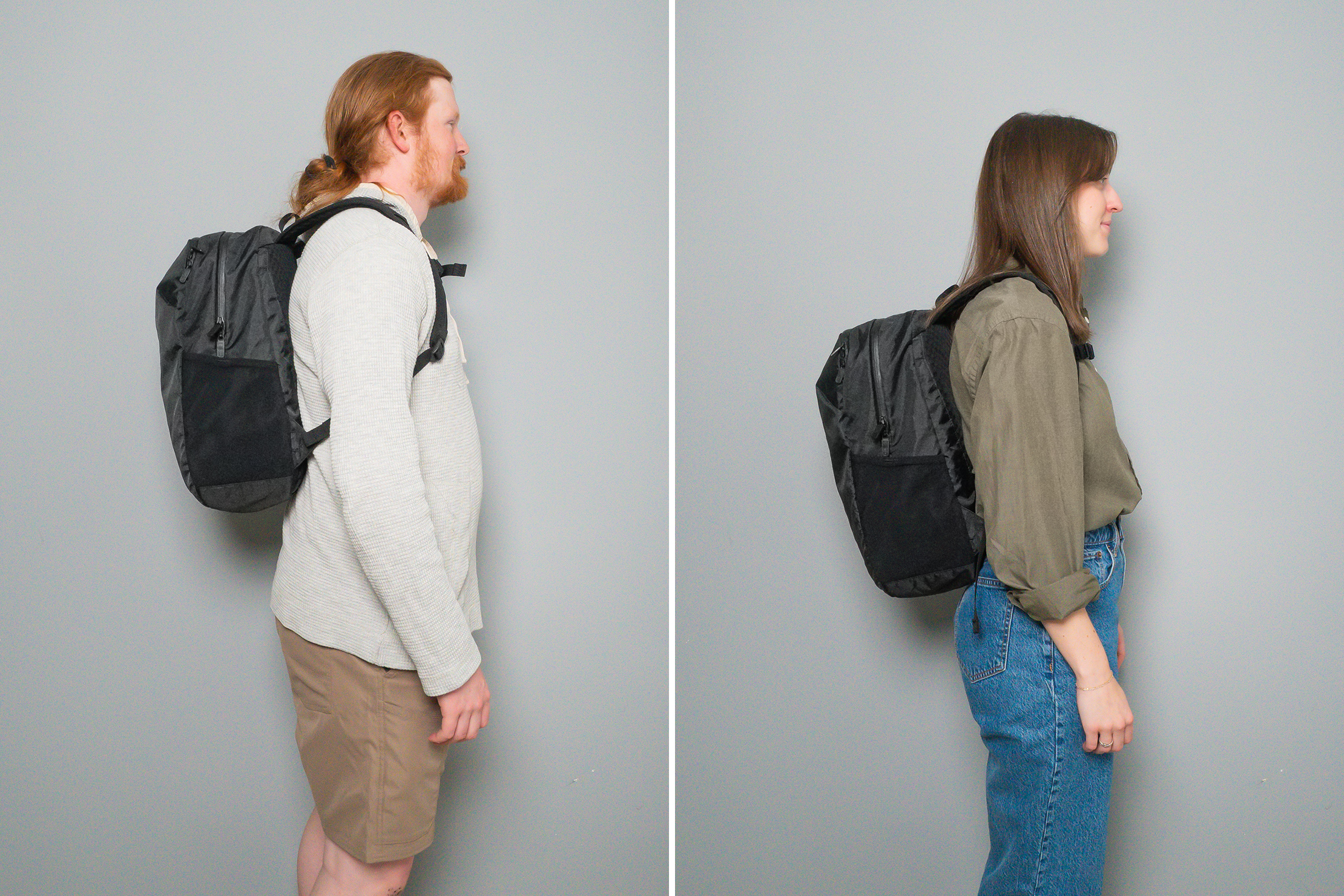
You may have already thought of the biggest downside of the Daypack Pro’s SHELL70RS material: its lack of structure. Indeed, unless you have it packed full, it’s likely to cave in at the front, showing how much empty space there is inside. This usually translates to a saggy carrying feeling, especially with the Daypack Pro’s big and boxy shape. Surprisingly, however, none of that bagginess translates into sagginess.
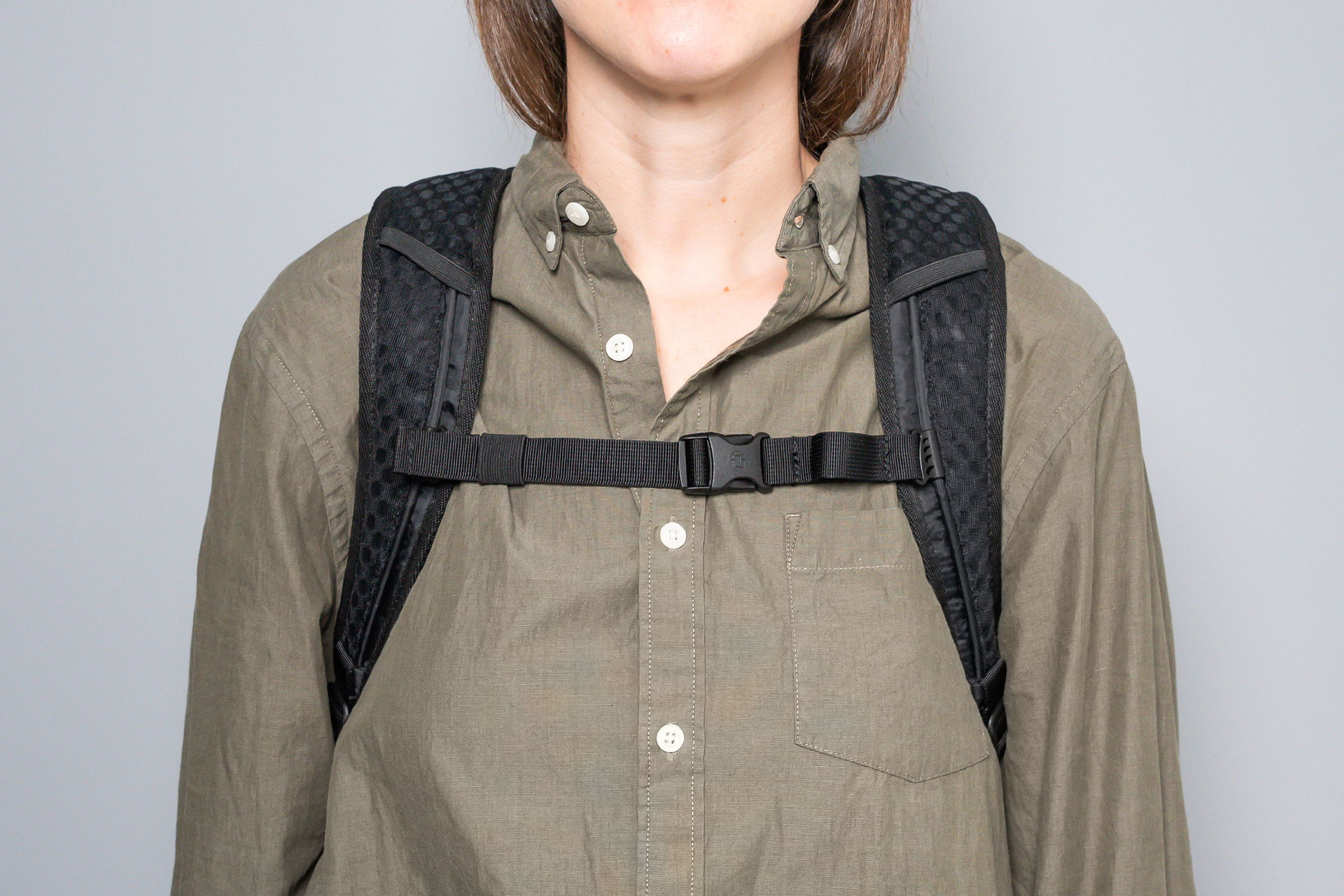
Firstly, the sternum strap pulls any extra weight slacking to the rear. Meanwhile, the aerated padding, though handicapped by all those holes, still has enough cushion to dampen the weight even when we have it fully packed. The back panel also does a good job of disguising the saggy feeling of the otherwise soft-structured Daypack Pro.
Inside The Backpack
What daypack would be complete without external water bottle pockets? Okay, plenty of them don’t have one, but we really like it when they do, just like the Daypack Pro. Tortuga keeps things simple by having stretchy mesh pockets off to the sides where you can put your travel water bottle of choice. We use insulated bottles in the 18-24 oz range, but these pockets are large enough for a 30 oz Nalgene.
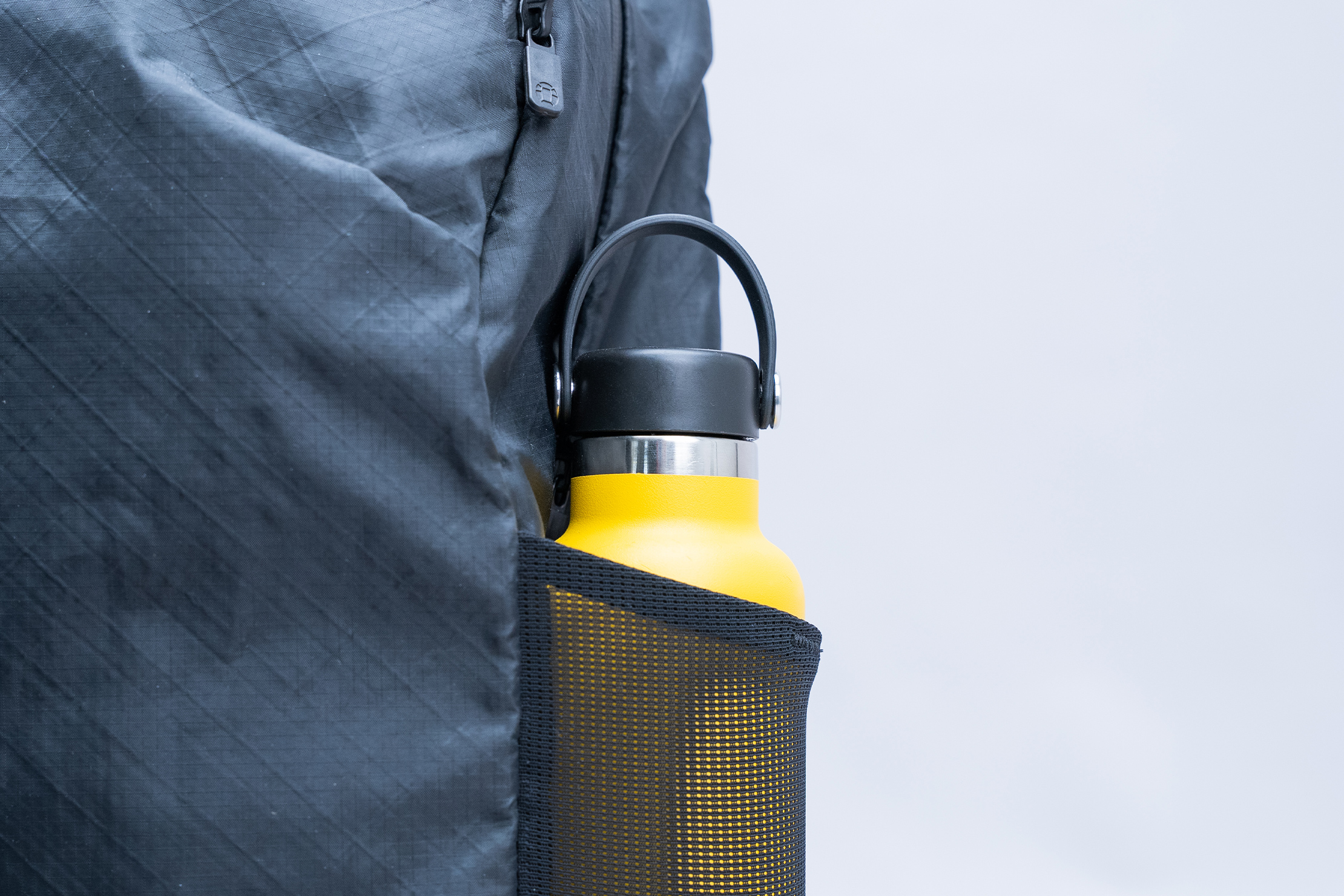
How well your bottle stays inside—if the bag tips over—largely depends on how big it is or how fully packed the main compartment is. If it’s not packed full, there’s not enough outward pressure to squeeze the bottle in place. The mesh’s reinforced elastic does its best, but it’s simply not that grippy, especially if your bottle’s still full and heavy.
Apart from those water bottle pockets, the top pocket is the only secondary pocket for storing everyday carry items. It’s quite roomy inside, so you shouldn’t have much trouble tossing everything you need. We certainly didn’t find it tricky, as we chucked in a full sunglasses case, a wallet, a smartphone, a pair of wireless earphones, and a set of house keys. The lattermost can be attached to the built-in key leash. It’s a bit short, but with the Daypack Pro’s large size, we can make it reach doorknobs—just.
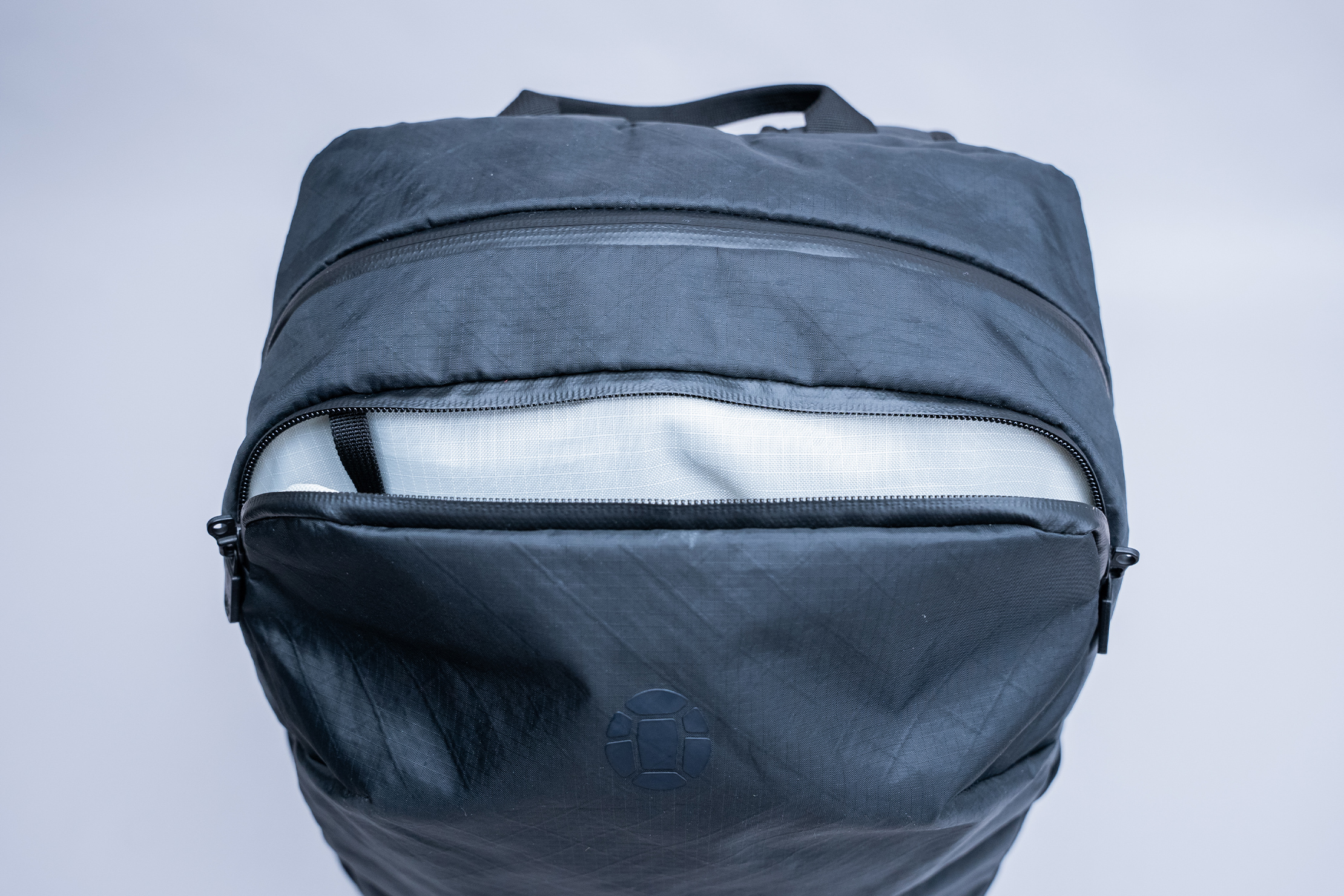
However, accessibility can be tricky because of the Daypack Pro’s relatively soft structure. As we mentioned, if you don’t have it fully packed, part of the top caves in. As you can imagine, that warps the Aqua-Guard-style zipper tracks, which are already resistive. Now, you have to do a bit of maneuvering, which requires both hands. This doesn’t sound like a big deal, but it can start to feel like it when it happens daily.
The main compartment opens in a horseshoe-shaped fashion that’s big enough for when you want to pack large items. The biggest gear we typically carry are packing cubes and large toiletry bags, which fit in the opening just fine. There’s no separate laptop compartment that would otherwise make the main compartment’s opening smaller. Instead, there’s a laptop sleeve within the main compartment itself. You would think that this makes direct access to your laptop tricky—and it kind of does—the sleeve is not that far back.
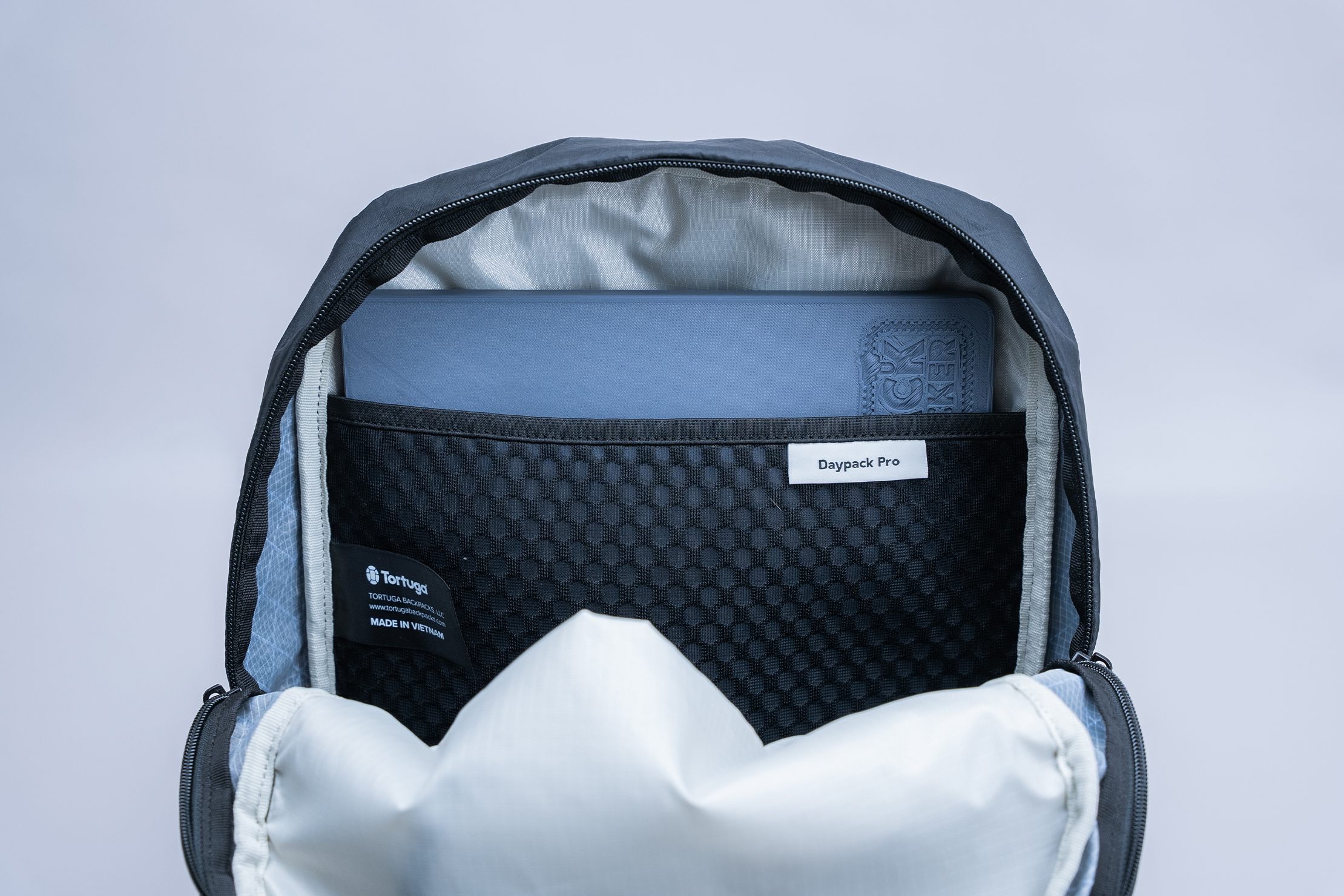
The laptop sleeve features a similar porous design as the shoulder straps and back panel. More importantly, it’s also a soft and cushioned material that feels very protective for a laptop. It’s big enough for a 16-inch MacBook Pro, but even the 13-inch MacBook we use feels quite secure in this sleeve. A sizable false bottom underneath dampens shocks from below whenever you set the bag down on hard surfaces.
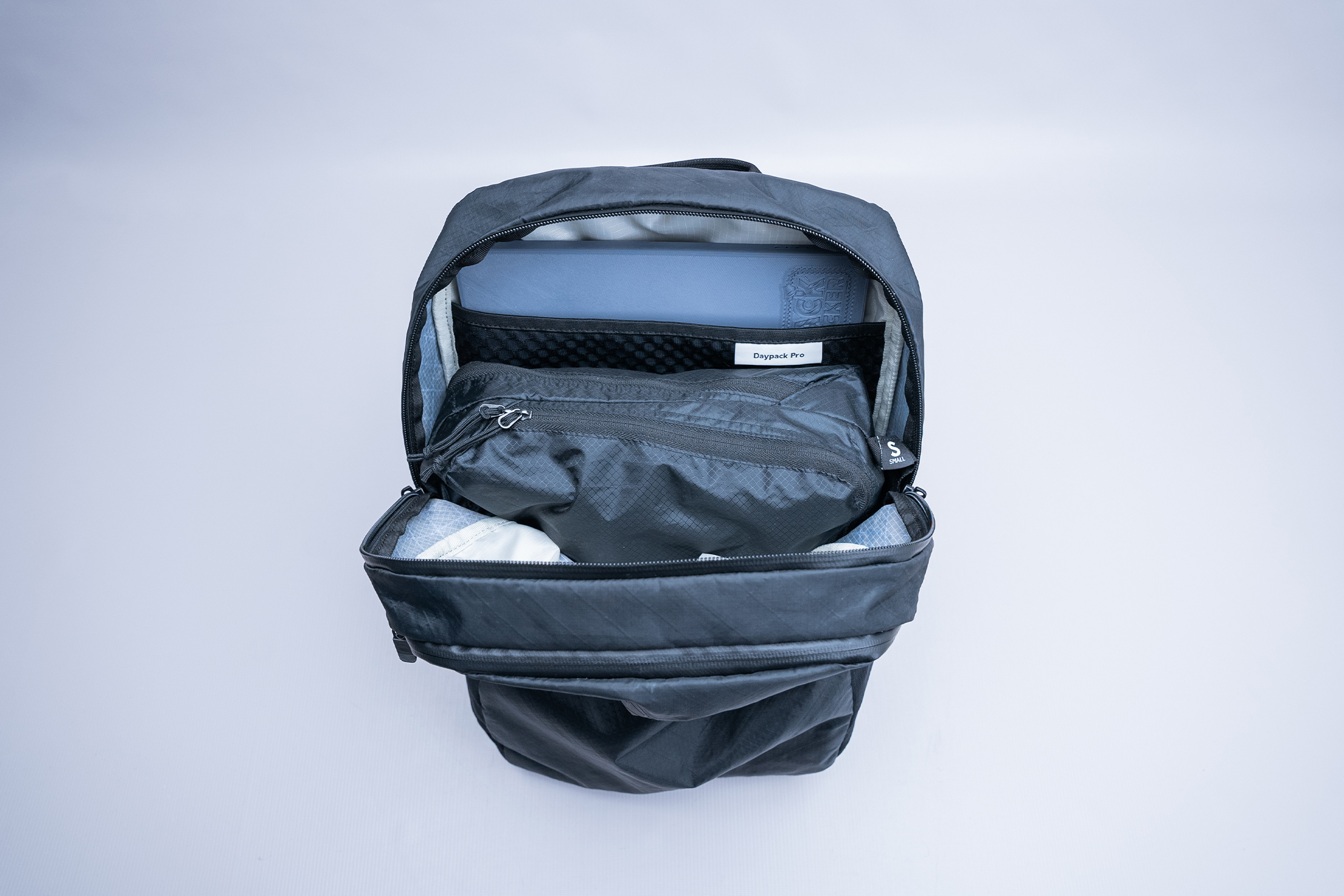
The main compartment itself doesn’t feature any extra organization apart from the laptop sleeve, but it does make up for it in sheer roominess. Packing cubes and other large gear can sit side by side comfortably, and it takes some filling before you need to start stacking items on top of each other. On the other hand, leaving the top area empty leads to that caving-in issue we pointed out before. Overall, this makes the Daypack Pro best for travelers who need to carry a lot daily, and those who will fully pack it, minimizing issues caused by its soft structure.
Usage Timeline
Condition: Excellent
- Structured material but still pretty thin; interested to see how it manages heavy loads
- Harness system seems pretty comfortable for a bag of this size
- Minimal organization, though the top pocket is sizeable for small gear
Condition: Excellent
- Extremely comfortable to wear even when it’s heavy
- Looks a bit too saggy for our taste when the bag isn’t completely full
- Lack of organization isn’t a huge deal, but we did miss having one or two smaller pockets to separate tiny gear







Get your questions about the Tortuga Daypack Pro answered from our team and the Pro Community right here on the page. Plus, join discussions with other members about gear, guides, and more.
Join Pack Hacker Pro or, Sign In